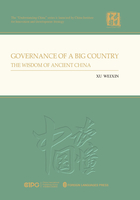
Part One Philosophies
Tao (the Way) is the essence of the universe; Heaven (tian) and Earth(di) are born from the Tao, each operating in its own way; Heaven, Earth, Man (ren), and things (wu) have the ways of their own. The harmony between man and nature (tain ren he yi) is the highest cultural concept in China, and all cultural concepts of nature, worldview, values, and governance are embedded in it. The ancient Chinese state governance took humanity as the logic rationality, which is reflected in the values and ideals, governance concept, governance goal, the concept of political achievement, capacity building, and governance methods. In terms of values and ideals, the highest state of “the commonwealth of the world for all” (tian xia wei gong, shi jie da tong) is achieved; in terms of governance concept, the people are regarded as the root of the state, and virtuous governance(ren zheng) is required; in terms of governance goal, exemplification of virtues and caution in giving punishment are practiced; in terms of the concept of political achievement, righteousness is valued over profit; in terms of capacity building, the “sageliness within and kingliness without”(nei sheng wai wang) are achieved, and the criterion of appointment of officials by selecting the worthy and promoting the capable is carried out; in the way of governance, it advocates the rule through non-action (wu wei er zhi) and the preparedness for the future (bei yu bu yu). Ancient China’s state governance is based on the concept of “impartiality and scrupulously abiding by one’s duty” (zhong he wei yu) so that everything is in its right place and has its own share. Moreover, the idea of “harmonizing all states” (xie he wan bang) established the people-to-people bonds among the peoples, and cultivating people is the way of good governance.